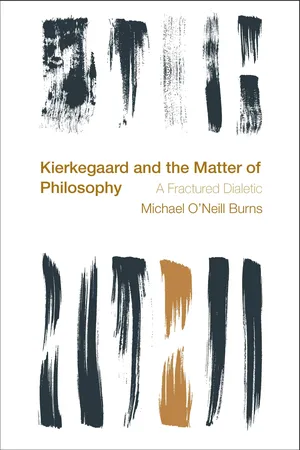
- 226 pages
- English
- PDF
- Available on iOS & Android
eBook - PDF
About this book
Søren Kierkegaard is often cast as the forefather of existentialism and an anti-Hegelian proponent of the single individual. Yet this book calls these traditional characterizations into question by arguing that Kierkegaard offers not only a systematic critique of idealist philosophy, but more surprisingly, a political ontology that is paradoxically at home in the context of twenty-first-century philosophical and political thought.
Through a close consideration of his authorship in the context of nineteenth-century German idealism, Michael O'Neill Burns argues that Kierkegaard develops an ontology, anthropology and theory of the political that are outcomes of his critical appropriation of the philosophical projects of Hegel, Schelling, and Fichte. While starting out in the philosophical concerns of the nineteenth century, the book offers an interpretation of Kierkegaard that shows his relevance to philosophers and political theorists in the twenty-first century.
Through a close consideration of his authorship in the context of nineteenth-century German idealism, Michael O'Neill Burns argues that Kierkegaard develops an ontology, anthropology and theory of the political that are outcomes of his critical appropriation of the philosophical projects of Hegel, Schelling, and Fichte. While starting out in the philosophical concerns of the nineteenth century, the book offers an interpretation of Kierkegaard that shows his relevance to philosophers and political theorists in the twenty-first century.
Frequently asked questions
Yes, you can cancel anytime from the Subscription tab in your account settings on the Perlego website. Your subscription will stay active until the end of your current billing period. Learn how to cancel your subscription.
No, books cannot be downloaded as external files, such as PDFs, for use outside of Perlego. However, you can download books within the Perlego app for offline reading on mobile or tablet. Learn more here.
Perlego offers two plans: Essential and Complete
- Essential is ideal for learners and professionals who enjoy exploring a wide range of subjects. Access the Essential Library with 800,000+ trusted titles and best-sellers across business, personal growth, and the humanities. Includes unlimited reading time and Standard Read Aloud voice.
- Complete: Perfect for advanced learners and researchers needing full, unrestricted access. Unlock 1.4M+ books across hundreds of subjects, including academic and specialized titles. The Complete Plan also includes advanced features like Premium Read Aloud and Research Assistant.
We are an online textbook subscription service, where you can get access to an entire online library for less than the price of a single book per month. With over 1 million books across 1000+ topics, we’ve got you covered! Learn more here.
Look out for the read-aloud symbol on your next book to see if you can listen to it. The read-aloud tool reads text aloud for you, highlighting the text as it is being read. You can pause it, speed it up and slow it down. Learn more here.
Yes! You can use the Perlego app on both iOS or Android devices to read anytime, anywhere — even offline. Perfect for commutes or when you’re on the go.
Please note we cannot support devices running on iOS 13 and Android 7 or earlier. Learn more about using the app.
Please note we cannot support devices running on iOS 13 and Android 7 or earlier. Learn more about using the app.
Yes, you can access Kierkegaard and the Matter of Philosophy by Michael O'Neill Burns in PDF and/or ePUB format, as well as other popular books in Filosofia & Idealismo in filosofia. We have over one million books available in our catalogue for you to explore.
Information
Table of contents
- Contents
- Acknowledgements
- Notes on Sources
- Introduction
- Chapter One: Idealism Before Kierkegaard
- Chapter Two: Anxiety and Ontology
- Chapter Three: Spirit and Society
- Chapter Four: Anxious Politics
- Chapter Five: The Fractured Dialectic in Recent European Materialism
- Conclusion
- Bibliography
- Index